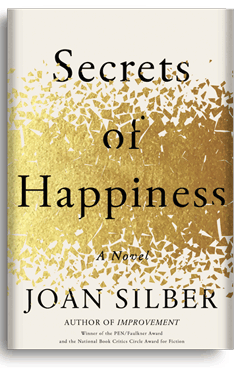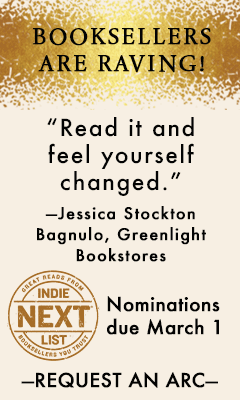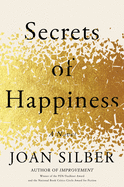Secrets of Happiness
by Joan Silber
Joan Silber is a painstaking observer of how lives touch each other across social divisions, of how surprising connections give those lives new direction, and of how, despite our polite insistence to the contrary, money plays as big a role as chance or fate in determining the courses those lives can take. Secrets of Happiness finds Silber linking together disparate lives and perspectives with Dickensian sweep but 21st-century economy, replete with sly humor and arresting anecdotes reminiscent of Grace Paley. Silber can capture the weight and texture of years in just a couple of piercing lines. There's nothing didactic in Silber's portrayal of contemporary lives shaped by financial considerations--a master storyteller, she lets persuasive offhand detail accumulate over the course of the novel, making the case by holding a mirror to life.
Silber's most recent novels might at first glance sound like nonfiction: 2017's Improvement, winner of the PEN/Faulkner and the National Book Critics awards for fiction, and now Secrets of Happiness, an incisive story of contemporary interconnectivity. These titles, with their echoes of the self-help section, suggest books that promise readers something more practical than what literary fiction tends to offer. In truth, though, all of Silber's novels concern precisely what has always been the concern of great novels: how to get better, how to find contentment, how one makes something out of one's self in a world ruled by money. They both could be called Great Expectations.
In Secrets of Happiness a succession of (mostly) New York narrators regale readers with their very recent history, telling the stories of how they got to wherever they are in intimate direct address, each new narrator someone who has played a role in an earlier story. Their accounts read like what you might overhear a table away as friends have a long, long lunch. "And then we began gradually to quarrel less, talk less, do everything less," one says of a failing romance. "We began to say staleness was natural in the life of a couple. For a few years we had (Tony's idea) a more or less open relationship, which many people said was far better than keeping secrets; I wouldn't recommend it."
The stories kick off when a lawsuit reveals that one narrator's father, a businessman who spends lots of time in Asia, has, in the narrator's words, "a whole other family" brought to the U.S. from Thailand and secreted away in Queens. The lives of those two families figure into--or edge against--the accounts from the novel's five other narrators, though the structure Silber has invented for this and her other recent books is less that of the traditional novel of interconnected stories than it is a vibrant social network.
Despite the deceptively straightforward prose, Secrets of Happiness can be dizzying as it spins its connections and themes: the businessman's secret son reports that his high school girlfriend married a scion of the Schuyler family, owners of a department store chain that's fallen on hard times. In the next chapter, a young woman tells us about her own affair with the Schuyler boy, whose marriage is failing and who downplays his wealth, as they film a documentary in Britain about the history of the mistreatment of workers in the garment industry--the industry that brought the businessman with the secret family to Thailand in the first place.
Silber leaves it to us to hear the meaning in these stories' echoing themes, but commonalities emerge, especially issues of inheritance. At times, as they work through the succession of surprises, disruptions, and bits of luck that have brought them to wherever they've gotten in this world, they note with a touch of bemusement that they're reminded of Great Expectations. They don't dwell on such connections, though, as Silber's raconteurs never waste a line. Instead, they're always on to the next thing, in prose that so persuasively captures that feeling of spoken disclosure that readers may find themselves, as they race ahead, occasionally offering back the encouraging cues we send when friends dish their way through a long story: Mmmhmm. Really? He did not!
Their tales feel lived rather than plotted, contemporary rather than archetypal, and yet they still somehow, suggest the concerns and coincidences that power Dickens's novels. That has something to do with the distribution of wealth in contemporary America and Victorian London. But it goes deeper. Secrets of Happiness demonstrates again and again how the life stories of so many of us today--muddling trajectories, uncertain heritage, and ad hoc families--in the end are still stories, often as unlikely as Pip and Estella's.
We tell them to ourselves; we tell them to others; sometimes, such as when we're lucky enough to read a novel like Secrets of Happiness, we take in a dozen or so at once. In telling or hearing or reading those stories, we find life's shape, maybe even hints at its meaning. In sorting the details, in judging what to emphasize and what to skim past, we may even find happiness. --Alan Scherstuhl








.jpeg)